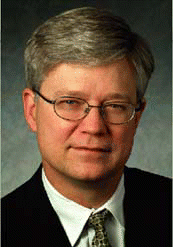But even before testing begins, a thorough patient history is vital. The otolaryngologist listens to the sensations and time frame presented by the patient. For example, is he or she talking about lightheadedness and a woozy feeling, or a spinning sensation caused by an hallucination of motion? How long does the sensation last-seconds, minutes, or hours?
Explore This Issue
October 2006The time frame is very important in making a diagnosis of vertigo versus dizziness, said Joel Goebel, MD, Director of the Dizziness and Balance Center, and Professor and Vice Chair, Department of Otolaryngology, Washington University, St. Louis. Noting that vertigo lasts seconds, not minutes or hours, he said, If you listen to the patient, you don’t want to hear how long they’re dizzy as much as how long they’re spinning, how long the room is moving around them. Anyone who spins for even a few seconds is going to feel dizzy for quite a while afterwards.
Dr. Goebel added that a patient suffering from a spinning attack lasting more than a few minutes is probably going to present to an emergency room or an internist, where the patient will receive a scan to rule out a vascular event. Vertigo lasting for ‘minutes’ can be a TIA [transient ischemic attack] if associated with other brainstem signs. It can be migraine or even Meniere’s disease, although migraine and Meniere’s usually have a history of starting in younger years.
Vertigo lasting for hours-the person who wakes up spinning and can’t walk very well-that’s most likely vestibular neuritis, Dr. Goebel said.
The patient’s complaint will guide the otolaryngologist in one direction or another.
With BPPV, the patient complains of intense vertigo with sudden body position changes, such as turning over in bed. The disorder is due to calcium carbonate debris-otoconia-that has become dislodged from the utricle, possibly due to head trauma, infection, inner ear disorder, or degeneration in advanced age. Although the diagnosis might be made with history alone, ENG may be needed, as may the Dix Hallpike maneuver, in which the patient is brought from a lying to a seated position while the physician looks for nystagmus. More difficult cases may be diagnosed with a rotary chair test, where the patient sits in a chair, head affixed to a head holder, and using video goggles as well as videonystagmography. This testing system uses software to lock on the pupil for a tracing of eye movement.

Leave a Reply